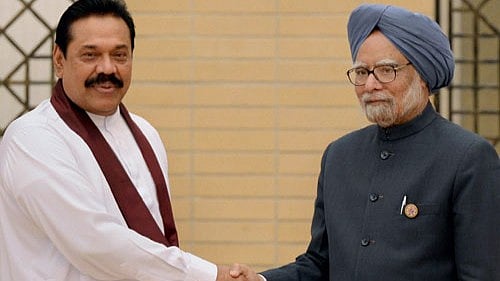
Former Prime Minister Manmohan Singh with then Sri Lankan president Mahinda Rajapaksa.
PTI
Chennai: Even before he could settle down in the Prime Minister’s chair in the summer of 2004, Manmohan Singh began facing the pressure of running a coalition government. The first salvo against the UPA-I government, whose engine was powered by regional satraps, was fired by Congress’ southern ally, Dravida Munnetra Kazhagam, just four days after Singh took oath as Prime Minister, in a surprise move after the then party chief Sonia Gandhi bowed out of the race.
DMK, which received three Cabinet and four Minister of State (MoS) berths, sent a missive to its nominees not to assume office after party chief M Karunanidhi, one of the key architects of the coalition, noticed “key differences” between the portfolios agreed and allotted.
Through the tenure of UPA-I, DMK came across as a very difficult ally for Singh, who was thrust into politics and the top post, with the party exerting pressure on the Prime Minister on a host of issues, notably the civil war in Sri Lanka and the subsequent sufferings of ethnic Tamils. In public, Singh lavished praise on Karunanidhi and the Dravidian leader too reciprocated.
It was only after portfolios like Shipping were allotted to T R Baalu and others, the DMK ministers assumed charge in their respective departments. Though the Congress leadership, especially Sonia Gandhi, handled the DMK directly, Singh did spend sleepless nights handling and fulfilling the demands of the Dravidian ally.
Manmohan Singh’s government did walk the extra mile to keep DMK in good humour by granting classical language status to Tamil, one of the oldest languages in the world, and announcing unviable projects like Sethusamudram Shipping Canal Project, but the DMK’s demand list only grew as the days and months passed.
In 2007, the DMK wanted the high-profile Dayanidhi Maran to be dropped from the Cabinet after a spat with his grand uncle Karunanidhi’s family. But the DMK spared the Congress and PM on this issue by forcing Maran to resign on his own. The biggest challenge for Manmohan Singh from the DMK came in October 2008 when the Karunanidhi-led party, whose MPs were crucial for UPA-I’s existence, threatened to quit over the Sri Lankan Tamils issue.
India had to work the phones with Sri Lanka to extract an assurance from the then President Mahinda Rajapaksa that civilian casualties would be avoided in the war. Not that alone, Singh had to rush his colleague, the late Pranab Mukherjee, to Chennai to assuage Karunanidhi and make him announce that he will not precipitate any crisis for the government.
In December 2008, Karunanidhi led a multi-party delegation to Singh to ratchet up pressure on him to dispatch Mukherjee to Colombo to press on the island nation’s government to “stop the war.” However, Singh resisted the pressure for over a month but with just months to go for the general elections, he had to send Mukherjee to Sri Lanka in January 2009 to hold discussions with Rajapaksa.
The pressure continued till May when the civil war ended with the killing of LTTE chief Velupillai Prabhakaran. Not just Singh, several of his ministers, including the then Home Minister P Chidambaram, were forced to make statements against Sri Lankan governments not just to appease DMK but their voters in Tamil Nadu.
And in May 2009, Singh had the last laugh after the Congress posted its best performance in decades by winning 206 seats on its own. He ensured that the DMK doesn't get plum portfolios like Shipping and Road Transport, and it was speculated that he put his foot down to ensure that Baalu was kept out of the Cabinet.
Baalu wasn’t accommodated in the Cabinet, though Singh was embarrassed by the allegations over auction of 2G in which DMK’s A Raja and others were accused of irregularities but were exonerated by a court in 2017.
Though the DMK’s numbers and its influence dwindled in UPA-II, Singh did come under pressure in 2012 on the Sri Lankan issue. Finally, India, for the first time, voted in favour of a resolution moved by the US and others against Sri Lanka in the UN Human Rights Council in Geneva. And, in 2013, when the DMK walked out of Singh’s government, it cited UPA’s inaction against Sri Lanka on the Tamil question as the reason.